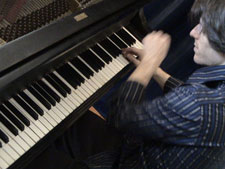
Reviews
The Best Jazz of 2010: Top 10 CDs “Inner rhythms, complex progressions and true interactivity characterize the California pianist’s collaboration with drummer Akira Tana and bassist Kai Eckhardt.”
Billy Strayhorn's oft-recorded standard "Lush Life" opens the music with the leader on an expansive piano solo providing cleaver right-hand finger-play on a generally lush treatment of one of Strayhorn's signature tunes. Paying tribute to a couple of inspirational figures in his career, Berman pens "Old Dylan" (for "Bob Dylan") and "Bill Frisell," two original pieces the trio performs energetically. The main inspirational tune of the album is obviously, "The Poet," and while dedicated to friend Klamka, this one just happens to be one of the best charts of the album containing a slight nod to John Coltrane's "Equinox."
Seemingly an instrumental ballad at first glance, "Old Style Tune" actually has a lot of kick to it featuring firm piano play, bass and drum solos that sounds like nothing old style in fact, pretty modern at that. After the short tribute-piece "Diane" (for Diane Clymer), the pianist takes off on an Allen Ginsberg read of "Mexico City Blues" with his own version titled "Spaghetti Eastern" where Eckhardt's featured bass work is only eclipsed by Berman best performance of the disc.
Tipping his hat to one of the greatest jazz musicians of our time, Berman designs the humble "Sound Poem" as a haunting exploration of the Bill Evans' style on a brief but beautiful tune. As he began the music, Berman closes with another solo performance, this time with a tender read of George and Ira Gershwin classic, "Someone to Watch Over Me." San Francisco-based pianist Ken Berman leads his very able trio into newly chartered territory on Sound Poetry, a sound and charming musical statement from a superb pianist and composer.”
This is probably not the place for a blow-by-blow because it's all well done and a very good example of a modern piano trio playing original material that doesn't sound like stolen goods. Acoustic Jazz-Rock, Bossa and some swinging numbers prevail. Tana, Eckhardt,and Berman each have something to say on their instruments and they say it here. And I think it's well done! It's an album I'll be happy to go back to and dig in to in the years to come. I'm especially pleased with this combination of players. I hope they do more!!”
Most of the performances on Looking Forward feature thoughtful playing and gradual development at a relatively quiet volume. This is the type of jazz that grows in interest with each listening because it is quite subtle, is full of inner heat, and its details tend to reveal themselves over time.
The overall music is intriguing and well worth a close listen.”
Known locally as both a bandleader as music teacher – he sits on the faculty of UC Berkeley's Music Department – Berman has garnered comparisons to Jarrett and Evans, probably more for his versatility than anything else. Tonally, he's funky and contemporary, more closely aligned to Vijay Ayer or Aaron Parks than straight-ahead players of the past. Even the prettier, moodier numbers on Looking Forward – ones like "Sailing to Byzantium" and "Reflections" – have a discernible pulse. Other songs, like "April Fools," are quick and tricky. "Pot Hole Road Rage" resists traditional harmony. Kai Eckhardt plays electric bass throughout, which gives the groove a sharper, contemporary edge.
Berman took a big risk on Looking Forward. He put together eight original tunes that varied in length and style, and chose an abstract concept (movement) to unify them. Looking Forward has no standards, no jazz versions of a pop tune, and no hip-hop backbeats. It straddles genre, but not intentionally. And his music is hard, to boot. But ultimately, the album makes good on its name. ”